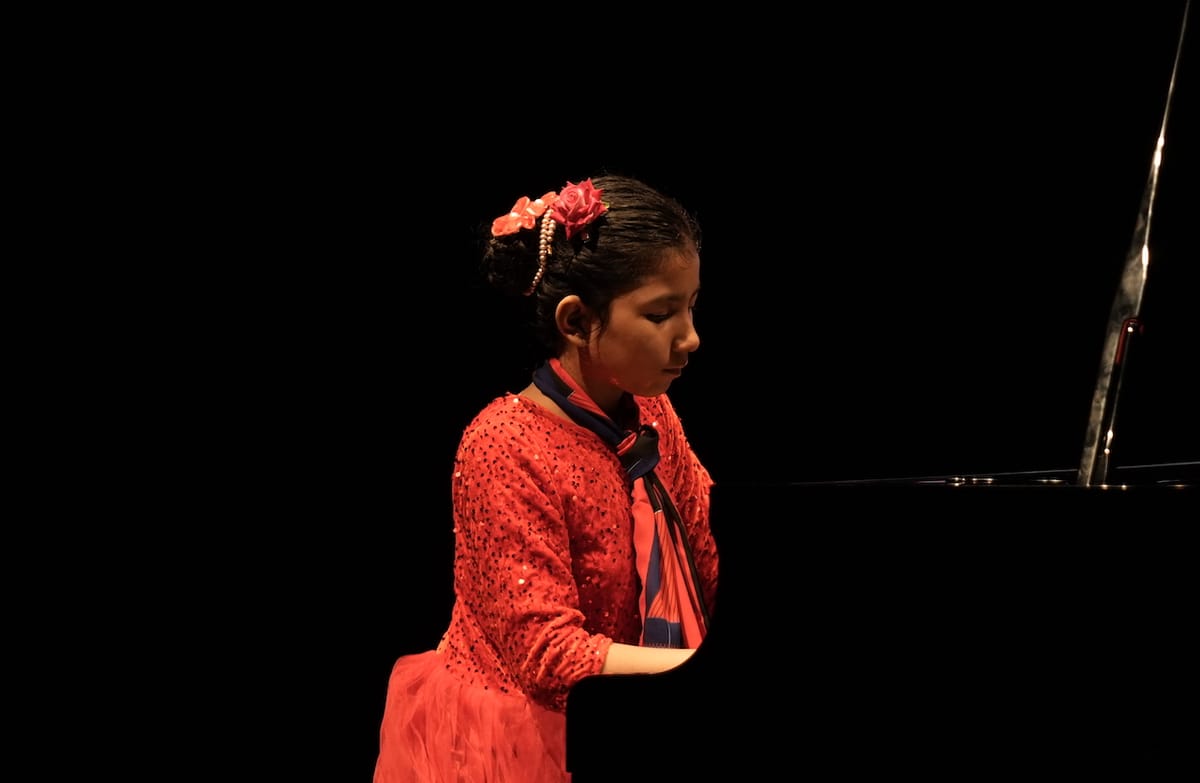The Inspiring Journey of Rose Dam Roy

Introducing Rose Dam Roy, a remarkable 11-year-old musician from Kolkata, India, whose journey into the piano began at the tender age of six under the guidance of Mr. Kaushik Das. Despite the challenges posed by the pandemic, Rose’s dedication to her craft has led her to excel in international competitions, securing top positions and garnering recognition from esteemed judges and musicians worldwide. In this interview, Rose shares insights into her musical journey, from her rigorous practice schedule to her aspirations for the future, offering a glimpse into the passion and perseverance driving her extraordinary talent.
Serenade Team: What initially sparked your interest in the piano, and how did your musical journey begin? Can you recall a specific moment or experience that solidified your passion for the piano?
Rose Dam Roy: My musical journey began at the age of 3.5 when my mother enrolled me in Bharatnatyam and Rabindra Sangeet. While I was introduced to both piano and violin at the age of 6, it was the piano that truly captivated me. At 9, I took a significant step forward by participating in my first competition at Crescendo, organized by The Calcutta School of Music. Winning accolades in both piano and violin categories drew me even closer to the world of Western classical music.
A pivotal moment in my piano journey occurred when my digital keyboard was upgraded to an upright piano after the competition. Shortly thereafter, my mother began sending recordings of my piano performances to various international competitions. It was during this time that the piece ‘Arabeske in C’ by Robert Schumann, introduced by my teacher, left a profound mark on me, solidifying my love for the piano.
ST: How do you manage your time between home schooling and your rigorous piano practice schedule? What strategies do you employ to ensure a balance between your academic studies and musical pursuits?
RDR: Balancing home schooling and rigorous piano practice requires a flexible yet structured approach. Rather than adhering strictly to a curriculum, I prioritize literature books that captivate my interest, often drawing inspiration from classical works I’m studying or plan to explore. To ensure balance, I’ve established a structured schedule. Weekends are dedicated solely to academic studies, allowing focused learning. Weekdays, on the other hand, are reserved for intensive piano practice, music theory exploration, and preparatory work for exams.
ST: How do you prepare for a performance, especially considering the diverse range of composers in your repertoire?
RDR: Preparing for a performance demands meticulous attention. I invest significant time and effort in ensuring each piece is polished to perfection. My process involves immersing myself in the intricacies of each composition, often by studying exemplary recordings on platforms like YouTube. Additionally, I conduct mock recordings of the entire repertoire, sometimes even staging full dress rehearsals for live performances.
Emotion is the essence of interpreting classical pieces and establishing a connection with the audience. To convey this emotion during my performances, I adopt a unique approach. Before playing a piece, I craft a narrative in my own words, exploring the emotions and storyline within the music. During the performance, I aim to translate this narrative into musical expression, infusing each note with the intended emotion. This method creates a deeply engaging and evocative experience for the audience, allowing them to connect with the music on a profound level.
ST: Apart from piano, you also engage in violin and Indian classical dance. How do these different art forms influence your musicality and approach to piano playing?
RDR: Engaging in both violin and Indian classical dance alongside my primary focus on piano has greatly influenced my musical journey. Playing the violin alongside piano during my early years not only refined my motor skills but also heightened my sensitivity to orchestral nuances, enriching my musical understanding. Currently, my exploration of Bharatnatyam and Kathak, two Indian classical dance forms, deepens my emotive expression within Western classical music. I view art as a universal language, transcending cultural boundaries, and my exposure to diverse Indian cultural forms has seamlessly integrated these influences into my piano playing.
ST: Where do you see yourself in the next few years as a musician, and what aspirations do you have in terms of your musical career?
RDR: Looking forward, I see myself deepening my skills within one of the world’s leading conservatories. I’m passionate about using my musical abilities to make a positive impact. Besides pursuing personal growth, I’m committed to using my platform to support humanitarian causes and advocate for peace through music. I hope to inspire and connect with fellow musicians and music enthusiasts, fostering a global community characterized by creativity, passion, and empathy.





